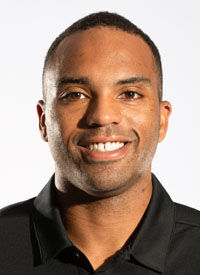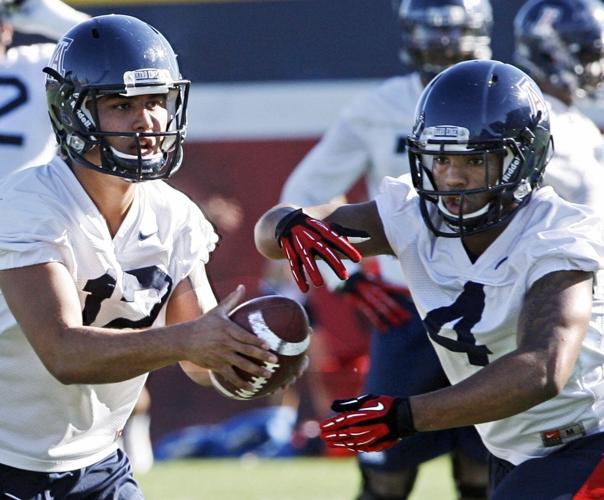There will be a familiar face on San Diego State’s sideline when the Arizona Wildcats play the Aztecs on Saturday.
No, it’s not Brady Hoke, former Arizona head coach Rich Rodriguez’s predecessor at Michigan.
It’s Pierre Cormier. The San Diego State graduate assistant played running back for the Wildcats in 2013 before being forced to medically retire due to blood clots found in his lungs.
“I just had a lot of pain that I was dealing with. … The next couple years I tried to get waivers to play, but it didn’t work out that way,” Cormier said.

Running back Pierre Cormier takes a handoff from quarterback Anu Solomon during a spring practice in 2014. Cormier, whose playing career at Arizona was cut short, stayed on as a graduate assistant before moving on to San Diego State.
Cormier finished school at the UA, then got into coaching. He’s served as a student assistant for the Wildcats during the final stages of the RichRod era and was a graduate assistant for the Kevin Sumlin regime from 2018-20.
Now he’s an Aztec. Cormier spoke with the Star about memories at the UA, life coaching football and what returning to Tucson means to him.
How are your emotions going into a game like this?
A: “I left San Diego when I was 18 and then came back when I was 26, so I was in Tucson for a long time as a player and then once my medical issue happened, I was able to get into coaching there. So, it’s going to be fun and exciting, and it’s at a place where I have a lot of memories. I learned a lot about myself when I was there. I’m coming back to my alma mater with my hometown team, so I’m just excited.”
Were you ever offered by San Diego State coming out of high school?
A: “We joke about that from time to time, because the running backs coach (Jeff Horton) is still here, but I didn’t have an offer here out of high school. But if you look back to who they signed that year, the guy just so happens to be one of the leading rushers in NCAA history, Donnel Pumphrey, and I’ve known him since we were kids. They had a guy and it worked out for them, and he’s one of the best players to ever come out of the program. But if they offered then, I would’ve considered it.”
How tough was it for you to hang up the shoulder pads and cleats and pick up a clipboard, especially considering you didn’t end your playing career on your own terms?
A: “It was very tough. I was 18 when it first happened and I’ll never forget getting out of the hospital on my 19th birthday. At that age, the dream of making it to the NFL was still very much alive. But for me, it was very, very challenging at first. I just dealt with a lot emotionally, but as time went on, I realized that it was just a head start on life. I had a lot of time to think about what I wanted to do after those couple years went by and still wasn’t cleared to play despite getting a second and third opinion. It was tough, but I had mentors, coaches and family members help me overcome that and now that I’m coaching, it’s actually more satisfying for me than playing, because I’m able to impact more people than just myself.”
What led you to coaching?
A: “It was something that I’ve always wanted to do and it started a lot sooner than anticipated. I just love football and so many coaches have impacted my life. Just seeing what they did for me; I thought if I could do that for other people for a living in a sport that I love, I’d love to do it. On top of that, I just love football and everything that it brings. Coaching happened naturally over time, to be honest with you.”
What was your best memory as a player for the Wildcats?
A: “That’s a tough one, but I’d say the upset over Oregon my freshman year. Watching Ka’Deem Carey do what he did made me think in the back of my mind, ‘This guy is off to the NFL, I could be like that.’ It was motivating for me to see that, because I kept seeing myself in that position for next season. As a player, that was the most exciting memory. We had a lot of fun my freshman year, and the guys that I came in with, we still stay in contact with each other.”
How did you become a graduate assistant? And then how were you able to stay with Sumlin’s staff?
A: “It was actually a unique situation: I was offered the GA spot with Coach Rodriguez’s staff with Coach (Marcel) Yates, and then Coach Sumlin came in and retained Yates. Fortunately for me, Coach Sumlin kept me on staff and his other staff members were very supportive of me having that role.”
How did you end up coaching defensive backs considering you were always an offensive player?
A: “It was a time where I was getting ready to graduate in December 2017. I was on offense as a student assistant, and had gotten to know Coach Yates over time just from talking to him. Then I would sit in on defensive meetings, and then eventually they had a spot open on defense but not on offense. One day, Yates walks up to me and says, ‘If I offer you this GA job, are you going to take it?’ I said, ‘Are you sure? I don’t know anything about defense.’ He was like, ‘Yeah.’ From there, Coach Rod gave him the green light … I’ve been on the defensive side of the ball ever since, and it’s something I enjoy and take a lot of pride in. I’ve learned defense from the ground up and I’m still learning it, but it’s given me the confidence to coach any position. It’s broadened my knowledge of football, and it’s been good.”
What’s the biggest difference between being a coach rather than a player?
A: “When you’re a player, you’re responsible for getting yourself ready for practice or for a game. As a coach, there’s a lot of moving parts to it. You’re responsible for helping the staff, getting the players ready for a game. So, there’s a lot of responsibility that goes along with coaching. It’s a selfless role, which was a big adjustment for me, because I was so used to doing what I had to do for myself. I think that was the biggest adjustment, but over time it just became natural for me. I can say confidently now that I’m a coach. It took me a little bit to say that confidently.”
Is there a RichRod-ism that you still preach to this day?
A: “One thing that Coach Rod was big on was players understanding the small window they have playing football. He couldn’t have emphasized it enough. He was also big on making the seniors the highlight of the team, because it was their last ride. One thing he would always tell the players: ‘You guys are living in a fantasy world, and you guys don’t even know it.’ When you’re at a certain age, you don’t really know what that means, but he was pretty much saying, ‘You’re in a time period that you will never get back. Enjoy it, learn everything you can from it and when you move on in life, you’ll be able to apply it.’ A lot of guys who played for him understand that and respect that.”
How would you look back on your time in Tucson?
A: “For me, it became a second home. I was born and raised in San Diego, but when I moved to Tucson, things just kept me there. At first it was school, then it was coaching — it just became a second home to me. As I reflect, I learned a lot about myself there. I’ve had the best and worst times there, so I’m just thankful for my teammates who became friends for life, and the coaches I’ve worked for and still keep in contact to this day. I’m just thankful to have those opportunities to work for them. Even the players I got to coach, some of them are still on the team. They were always respectful in practice and meetings, so I look back on that stuff, and I’m just thankful for it. It ultimately got me to where I’m at today.”





